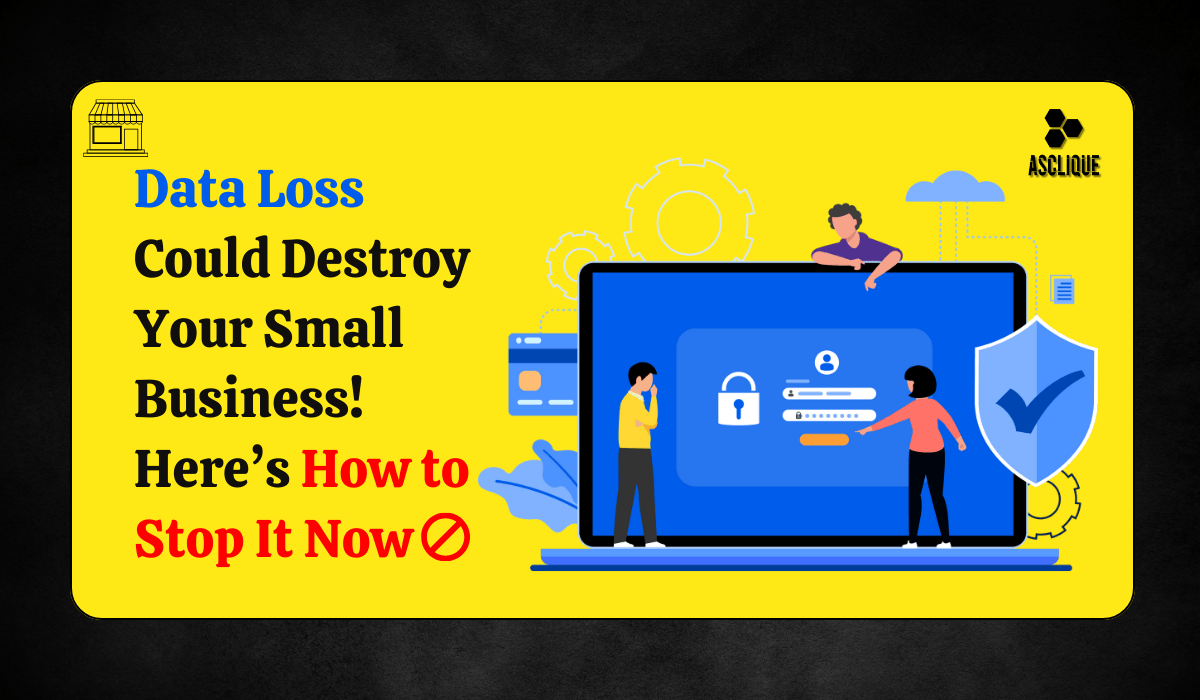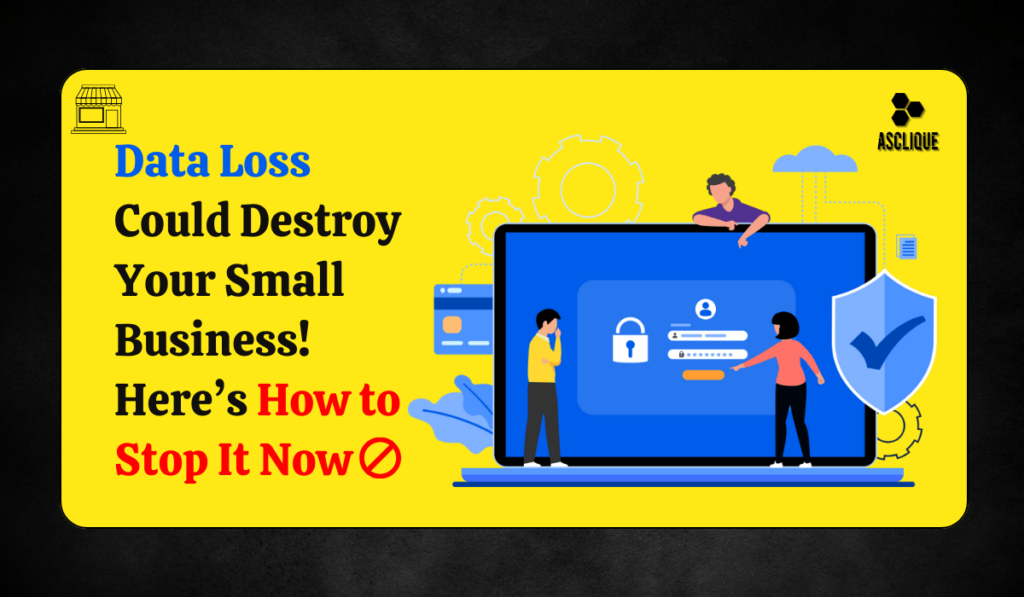Data is the foundation of every contemporary small business. From customer information, marketing metrics, SEO tactics, to social media engagement, losing important data can cause serious setbacks. Many small businesses, however, downplay the significance of data security, making them susceptible to cyber attacks, accidental erasures, or system crashes. In the competitive online marketing environment, whether a company can keep and secure its data determines its online visibility, search engine rankings, and marketing return on investment. Simple data loss prevention for small businesses can help to protect valuable data and provide continuity in SEO and online marketing campaigns.
This article will delve into simple data loss prevention for small businesses, with a view to how small businesses can safeguard digital property while maximizing their marketing efforts.
The Importance of Data Security in Digital Marketing
In social media marketing, content marketing, and SEO, businesses use a great deal of data to inform decisions, enhance audience targeting, and maximize campaign optimization. Data loss from cyberattacks, accidents, system failures, or human errors can have a huge impact on digital marketing performance.
How Data Loss Impacts Digital Marketing
- SEO Performance Downslide: Losing vital website content, backlinks, or keyword research data can result in reduced search rankings, decreased traffic, and poor search engine visibility.
- Social Media Interruptions: In case social media accounts get compromised or deleted, companies can lose followers, engagement, and brand credibility, impacting marketing momentum.
- Ad Campaign Data Loss: Pay-per-click campaigns like Google Ads, Facebook Ads, and LinkedIn ads depend on cached audience and performance information. Its loss may mean wasteful expenditure of budget and ineffective advertising.
- Email Marketing Disruptions: Email marketing lists that include subscriber data, automation campaigns, and campaign reporting are the keys to successful engagement. Losing them will halt lead nurturing and customer retention initiatives.
- Reputation Damage: Consumers trust companies that protect their personal and transactional information. A breach may cause customer loss of confidence, legal exposure, and compliance failure.
To stay strong online, companies need to put in place simple data loss prevention for small companies, such that their marketing efforts are still effective, data is safe, and brand reputation is protected.
Essential Data Loss Prevention Strategies for Small Businesses

Establish a Comprehensive Backup System
Routine backup of key business data means that useful information can be restored in the event of a cyberattack or unintended deletion. Small businesses would do well to have easy data loss prevention for small businesses in order to avoid expensive downtime.
Best Practices for Backups:
- Employ Cloud-Based Backup Tools: Google Drive, Dropbox, OneDrive, and Amazon S3 provide secure, elastic storage. Cloud backups maintain data safe from local hardware breakdowns.
- Schedule Automatic Backups: Backups ensure uniformity and avoid human error. Companies need to schedule weekly or daily backups to have recent copies of key information.
- Have Multiple Copies of Backups: Save copies at separate locations (cloud and external hard drives) to minimize threats. If a system crashes, another is available.
- Test Backup Restorations on a Regular Basis: Make sure backed-up information can be easily restored when it is required. Most companies save backups but never test them, which may create problems during recovery.
Cloud-based storage solutions do not only bring security but also facilitate collaboration through the ability to access data on various devices safely. Simple data loss prevention for small businesses means uninterrupted workflow efficiency and less business downtime.
Secure Website and SEO Assets
A company’s website is the backbone of its digital marketing strategy and online presence. If a website is hacked or critical SEO information is lost, traffic and rankings can plummet. Basic data loss prevention for small businesses involves securing website infrastructure to preserve digital marketing performance.
Methods to Protect Website Data:
- Implement SSL Encryption (HTTPS): Encrypts website traffic so that customer information cannot be accessed by unauthorized personnel. A secured website instills confidence and increases SEO rankings.
- Enable Regular Backups: Plug-ins such as UpdraftPlus for WordPress will automate backups for websites, with data never lost forever.
- Secure Login Credentials: Implement two-factor authentication (2FA) on website admin credentials to minimize chances of hacking.
- Track Website Security: Utilize tools such as Google Search Console and Sucuri to identify vulnerabilities and resolve security issues before they become major problems.
SEO can take months to establish, but a single cyberattack can destroy years of effort. By employing simple data loss prevention for small businesses, organizations can protect their online presence and preserve online trust.
Protect Marketing Analytics and CRM Data
Marketing analytics software such as Google Analytics, Facebook Pixel, HubSpot, and SEMrush retain essential information regarding site visitors, advertising effectiveness, and audience demographics. Losing this data can be very detrimental to digital marketing campaigns. Basic data loss prevention for small businesses involves securing these tools from breaches.
Protecting Marketing Analytics and CRM Data:
- Limit Access to Trusted Team Members: Impose varying levels of permission among marketing personnel to avoid unauthorized alterations.
- Enable Data Encryption: CRM systems such as Salesforce and HubSpot provide encrypted storage to protect customer information.
- Utilize Secure API Connections: During third-party tool integration, make sure they meet data protection requirements to eliminate vulnerabilities.
- Export and Back Up Marketing Data on a Regular Basis: Save key reports to an outside secure space for contingency purposes.
By obtaining marketing and analytics information, companies can keep on optimizing campaigns without interruptions caused by data loss. Implementing easy data loss prevention for small businesses is imperative to maintaining marketing growth.
Enhance Social Media Security
Social media sites are the main channels of communication for companies. A hacked social media account can harm a brand’s reputation and result in data loss in the form of lost posts, followers, or unauthorized access. Basic data loss prevention for small businesses keeps social accounts safe.
How to Protect Social Media Accounts:
- Turn on Multi-Factor Authentication (MFA): Secure accounts with added authentication steps to prevent unauthorized logins.
- Use a Social Media Management Tool: Tools like Hootsuite, Buffer, and Sprout Social store content securely and provide access control features.
- Restrict Admin Access: Restrict admin access to certain roles (Admin, Editor, Moderator) for various team members to reduce security risks.
- Monitor Suspicious Activity: Activate security alerts for login attempts from unfamiliar locations and check account activity logs regularly.
A properly defended social media footprint protects marketing initiatives to be seamless and continuous. Small businesses with effortless data loss protection can engage consumer trust while availing of marketing campaigns against impending PR crisis situations.
Lock Down Email Marketing Data
Email marketing is the best way to nurture leads, keep customers on board, and generate sales. Losing email subscriber lists or automation sequences can hurt a business’s ability to generate revenue. Easy data loss prevention for small businesses guarantees that email marketing goes on uninterrupted.
Email Security Features:
- Use Reputable Email Marketing Tools: Products such as Mailchimp, ActiveCampaign, and ConvertKit have built-in security measures.
- Enable Email Authentication (SPF, DKIM, DMARC): Assists in protecting from phishing and spoofing email attacks.
- Encrypt Subscriber Lists: Encrypt email lists so they cannot be viewed by unauthorized people.
- Back-Up Campaign Data Periodically: Download email lists and campaign reports to an external hard drive or cloud storage.
By securing email marketing information, companies can keep on nurturing leads and driving conversions uninterrupted. Basic data loss prevention for small businesses gives peace of mind and business continuity.
Secure Paid Advertising Accounts
Numerous companies spend large amounts on Google Ads, Facebook Ads, LinkedIn Ads, and other PPC ad campaigns. Unauthorized access to ad accounts can lead to fraudulent spend and campaign disruption. Basic data loss prevention for small businesses is critical to safeguarding ad investments.
Preventive Measures against Ad Account Fraud:
- Turn on Account Alerts for Suspicious Spend: Track ad accounts for unanticipated budget rises to identify fraud.
- Install Safe Payment Options: Employ virtual charge cards or corporate accounts with limiting balances to secure against financial losses.
- Limit Permission Levels: Appoint defined permissions for team members to avoid unwarranted amendments.
- Employ Manager Accounts for Business: Facebook and LinkedIn provide centrally managed account resources for enhanced safety.
By securing advertising accounts, small businesses can avoid wasted ad spend and campaign failure. Simple data loss prevention for small businesses guarantees that PPC campaigns are profitable and safe.
Train Employees on Data Security Best Practices
Most data breaches are caused by employee mistakes. Educating employees on cybersecurity best practices can lower risks dramatically. Simple data loss prevention for small businesses begins with an educated team.
Key Training Topics:
- How to recognize phishing messages and dangerous attachments.
- Safe password management with password managers and specialized logins.
- Safe file-sharing habits to avoid accidental data leakage.
- Knowledge of data privacy laws (GDPR, CCPA) to stay compliant.
Investing in staff education assists in developing a data security consciousness culture, making data loss incidents less likely. Simple data loss prevention for small businesses can be put in place by companies, which then can protect precious information and improve internal security.
Conclusion
Small businesses must be proactive to use straightforward data loss prevention for small businesses to protect SEO, online marketing, and social media campaigns.
By backing up information, securing accounts, encrypting email lists, and training employees, organizations can prevent data loss incidents, cyberattacks, and marketing interruptions.
In today’s world of technology, protection of data is a critical aspect of prosperity in business. Giving utmost importance to protecting data guarantees small businesses can still grow, retain customers, and maximize marketing campaigns without interruption.
FAQs
What are the most frequent reasons behind data loss for small businesses?
The most prevalent reasons for data loss are cyberattacks, accidental deletion, hardware failure, ransomware attacks, and human mistakes. Simple data loss prevention for small businesses can avoid these risks.
How do small businesses avoid data loss in social media marketing?
To avoid data loss in social media marketing, companies need to turn on multi-factor authentication (MFA), utilize social media management tools such as Hootsuite, and restrict admin access to reliable team members.
Why is data security critical in SEO and digital marketing?
Data is used in SEO and digital marketing to tailor strategies. When website analytics, backlink analyses, or customer data are lost, search performance and marketing return on investment will suffer.
What backup solutions are recommended for small companies?
Recommended backup solutions for small companies are popular cloud backup systems such as Google Drive, Dropbox, OneDrive, Amazon S3, and WordPress backup add-ons like UpdraftPlus.
How frequently must small businesses backup their data?
Small businesses must backup their data at least on a daily basis for important data such as customer records, websites, and marketing analytics. Automated backups provide continuous protection.

